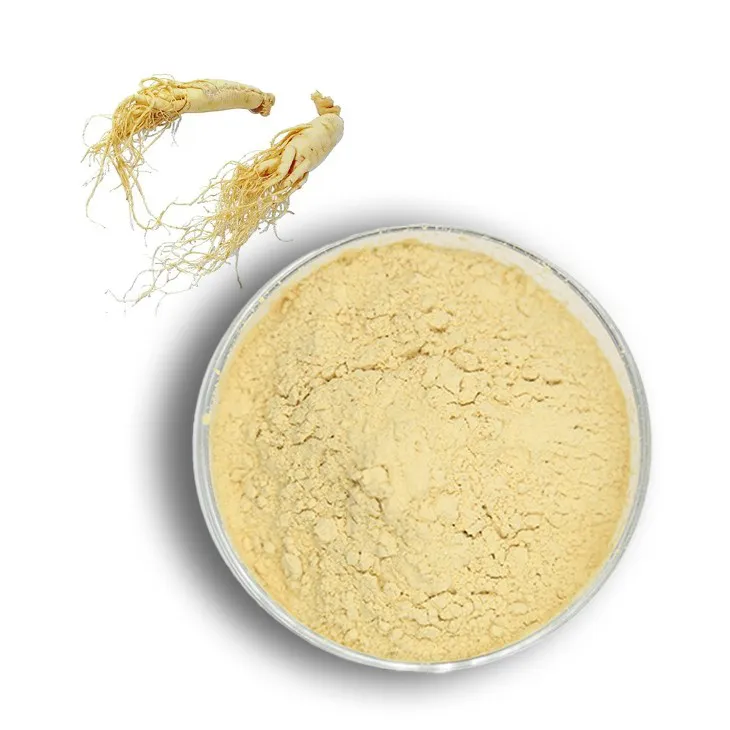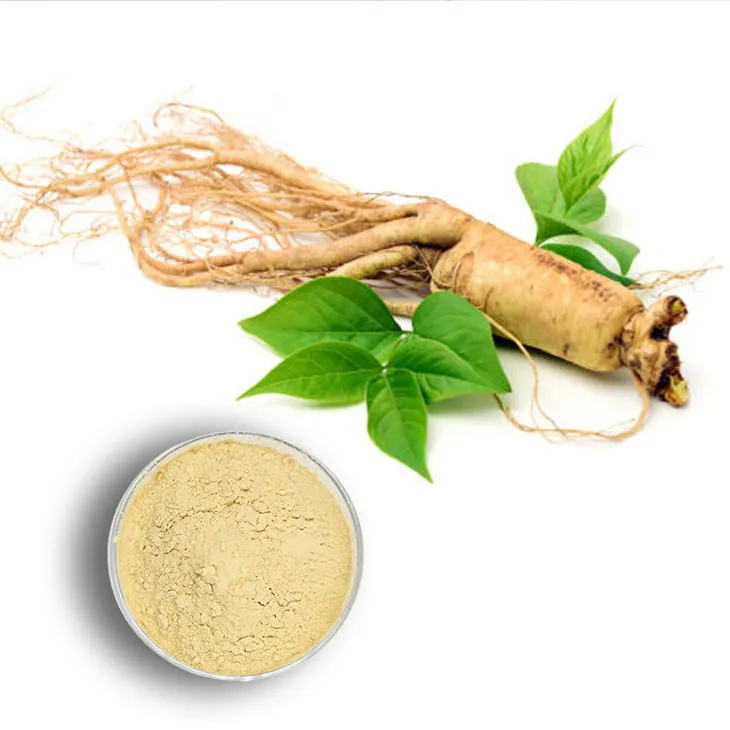- 0086-571-85302990
- sales@greenskybio.com
Use ginseng root extract? Make sure you source from sustainable suppliers!
2024-12-16

1. Introduction
Ginseng Root Extract has long been a prized ingredient in the world of natural products. Its popularity stems from its reputed health benefits, which range from boosting energy levels to enhancing cognitive function. As the demand for Ginseng Root Extract continues to rise, it is crucial to consider the source of this valuable extract. Sourcing from sustainable suppliers is not just an environmental consideration but also an ethical and quality - assurance measure.

2. Environmental Aspects
2.1. Conservation of Ginseng Species
Ginseng is a slow - growing plant. Wild ginseng, in particular, takes years to reach maturity. Over - harvesting from the wild has led to a significant decline in ginseng populations in many regions. By sourcing from sustainable suppliers, we can ensure that proper conservation measures are in place. These suppliers are more likely to support initiatives such as replanting programs. For example, some sustainable ginseng farms in North America have implemented strict harvesting schedules that allow the plants enough time to reproduce and replenish the population. This helps in maintaining the ecological balance and preventing the extinction of ginseng species.
2.2. Protection of Natural Habitats
When ginseng is harvested unsustainably, it often results in damage to its natural habitats. Ginseng plants are typically found in forested areas. Unsustainable harvesting methods, such as clear - cutting or over - trampling the forest floor, can disrupt the delicate ecosystems. Sustainable suppliers, on the other hand, use methods that minimize environmental impact. They may practice selective harvesting, which involves carefully choosing which plants to harvest while leaving the surrounding habitat intact. Additionally, sustainable suppliers are more likely to engage in forest management practices that promote the overall health of the ecosystem. For instance, they might work to control invasive species or protect water sources within the ginseng - growing areas.

3. Ethical Considerations
3.1. Fair Trade and Labor Practices
When choosing a sustainable supplier for Ginseng Root Extract, ethical labor practices are an important factor. Fair trade ensures that the workers involved in the cultivation and extraction of ginseng are paid fair wages and work in safe conditions. In some regions, ginseng farming can be labor - intensive. Sustainable suppliers are more likely to adhere to international labor standards. For example, they will not engage in child labor or forced labor. Moreover, fair trade also means that the local communities where ginseng is sourced benefit from the industry. This can include investment in local infrastructure, education, and healthcare. By supporting sustainable suppliers, consumers are indirectly promoting these ethical labor and community - development practices.
3.2. Respect for Indigenous Rights
In many areas where ginseng is native, there are indigenous communities that have a long - standing relationship with the plant. These communities often have traditional knowledge about ginseng cultivation and use. Sustainable suppliers should respect the rights of these indigenous groups. This includes obtaining their consent for harvesting ginseng on their lands, and sharing the benefits of the ginseng trade with them. For example, some sustainable ginseng operations in Asia collaborate with indigenous tribes. They may involve the tribes in decision - making processes regarding ginseng management, and also support the preservation of indigenous cultural practices related to ginseng.

4. Quality Aspects
4.1. Purity and Potency
Sustainable suppliers are more likely to have strict quality control measures in place for ginseng root extract. Since they are concerned with the long - term viability of their business, they invest in ensuring the purity and potency of their products. For example, they may use advanced extraction techniques that preserve the active compounds in ginseng. By contrast, non - sustainable sources may cut corners to reduce costs, which can result in a lower - quality extract. This could mean that the ginseng root extract contains impurities or has a lower concentration of the beneficial compounds. When using ginseng root extract for health or cosmetic purposes, the purity and potency are crucial factors in achieving the desired results.
4.2. Traceability
Another quality - related advantage of sourcing from sustainable suppliers is traceability. Sustainable suppliers can often provide detailed information about the origin of the ginseng root, including where it was grown, how it was harvested, and the extraction process used. This level of traceability is important for several reasons. First, it allows consumers to make informed decisions about the products they are using. Second, it helps in case of any quality - related issues, as the source of the problem can be easily identified. In the event of a product recall, for example, being able to trace the ginseng root extract back to its source is essential for effective management.

5. How to Ensure Sustainable Sourcing
5.1. Research and Certification
- One of the first steps in ensuring sustainable sourcing of ginseng root extract is to conduct thorough research. Look for suppliers who are transparent about their sourcing practices. This can include researching their websites, where they should provide information about their ginseng farms, harvesting methods, and any conservation efforts they are involved in.
- Certifications are also a reliable indicator of sustainable sourcing. Look for certifications such as Organic or Fairtrade labels. These certifications are typically awarded by independent organizations that have strict criteria for environmental and ethical practices. For example, an Organic certification ensures that the ginseng was grown without the use of synthetic pesticides and fertilizers, which is not only better for the environment but also for the quality of the final extract.
5.2. Supplier Relationships
- Establishing a good relationship with your supplier is key. This allows you to have direct communication with them regarding their sustainability practices. You can ask questions about their sourcing policies, quality control measures, and how they ensure compliance with ethical and environmental standards.
- Visiting the supplier's facilities, if possible, is also a great way to assess their sustainability. You can observe their farming practices, the working conditions of their employees, and the overall environmental management on - site.
5.3. Industry Standards and Regulations
- Stay informed about the industry standards and regulations related to ginseng sourcing. Different regions may have specific rules regarding the cultivation, harvesting, and trade of ginseng. For example, some areas may have restrictions on the amount of wild ginseng that can be harvested. By understanding these regulations, you can ensure that your supplier is operating within the legal framework.
- Support industry initiatives that promote sustainable ginseng sourcing. This can include joining associations or groups that work towards sustainable development in the ginseng industry. By being part of these initiatives, you can contribute to the overall improvement of sustainable sourcing practices in the industry.

6. Conclusion
In conclusion, when using ginseng root extract, sourcing from sustainable suppliers is of utmost importance. Considering the environmental, ethical, and quality aspects associated with ginseng, sustainable sourcing is not only beneficial for the planet and the people involved but also for the end - user. By taking the steps outlined above to ensure sustainable sourcing, we can all contribute to a more sustainable future for the ginseng industry and enjoy the benefits of high - quality ginseng root extract.
FAQ:
Q1: Why is it important to source ginseng root extract from sustainable suppliers?
It is crucial for several reasons. Environmentally, sustainable sourcing helps protect the natural habitats where ginseng grows. Ginseng is a slow - growing plant, and over - harvesting from non - sustainable sources can lead to the depletion of wild ginseng populations. Ethically, sustainable suppliers often follow fair labor practices in the cultivation and harvesting process. From a quality aspect, sustainable suppliers are more likely to use proper cultivation methods, which can ensure a high - quality ginseng root extract.
Q2: How can one identify a sustainable supplier of ginseng root extract?
Look for certifications such as organic certifications, which often imply sustainable farming practices. Research the supplier's reputation, for example, by checking online reviews or asking for references from other businesses in the natural products industry. Inquire about their sourcing methods, whether they support wild - ginseng conservation and if they have measures in place to ensure long - term availability of ginseng. Also, find out if they are involved in any sustainable agriculture initiatives or partnerships.
Q3: What are the potential consequences of using ginseng root extract from non - sustainable sources?
If the ginseng root extract is sourced from non - sustainable sources, it can contribute to the endangerment of ginseng species, especially wild ginseng. This can disrupt the ecological balance in the areas where ginseng grows. Additionally, the quality of the extract may be compromised as non - sustainable sources may not follow proper cultivation and harvesting techniques. It may also be associated with unethical labor practices in some cases.
Q4: Are there any regulations regarding the sustainable sourcing of ginseng root extract?
Yes, there are regulations in some regions. For example, there are laws governing the harvesting of wild ginseng to protect it from over - exploitation. Some countries also have regulations regarding the labeling of ginseng products to ensure consumers are informed about the origin and sustainability of the product. However, the level of enforcement and the comprehensiveness of these regulations can vary from place to place.
Q5: Can sustainable sourcing of ginseng root extract affect the price?
It can potentially affect the price. Sustainable sourcing often involves more labor - intensive and environmentally - friendly practices, which may increase the cost of production. However, in the long run, it can also ensure the stability of the supply chain, which may help to prevent price spikes due to shortages. Also, consumers are increasingly willing to pay a premium for sustainably - sourced products, which can influence the market dynamics.
Related literature
- Sustainable Ginseng Cultivation: Best Practices and Future Directions"
- "The Importance of Sustainable Sourcing in the Ginseng Industry"
- "Ginseng Root Extract: Quality and Sustainability"
- ▶ Hesperidin
- ▶ Citrus Bioflavonoids
- ▶ Plant Extract
- ▶ lycopene
- ▶ Diosmin
- ▶ Grape seed extract
- ▶ Sea buckthorn Juice Powder
- ▶ Fruit Juice Powder
- ▶ Hops Extract
- ▶ Artichoke Extract
- ▶ Mushroom extract
- ▶ Astaxanthin
- ▶ Green Tea Extract
- ▶ Curcumin
- ▶ Horse Chestnut Extract
- ▶ Other Product
- ▶ Boswellia Serrata Extract
- ▶ Resveratrol
- ▶ Marigold Extract
- ▶ Grape Leaf Extract
- ▶ New Product
- ▶ Aminolevulinic acid
- ▶ Cranberry Extract
- ▶ Red Yeast Rice
- ▶ Red Wine Extract
-
Lemon Balm Extract
2024-12-16
-
Peppermint Oil
2024-12-16
-
Baicalin
2024-12-16
-
Alisma Extract
2024-12-16
-
Okra Extract
2024-12-16
-
Lycopene
2024-12-16
-
Acerola Juice Powder
2024-12-16
-
Licorice Root Extract Powder
2024-12-16
-
Genistein
2024-12-16
-
Beta Carotene
2024-12-16





















